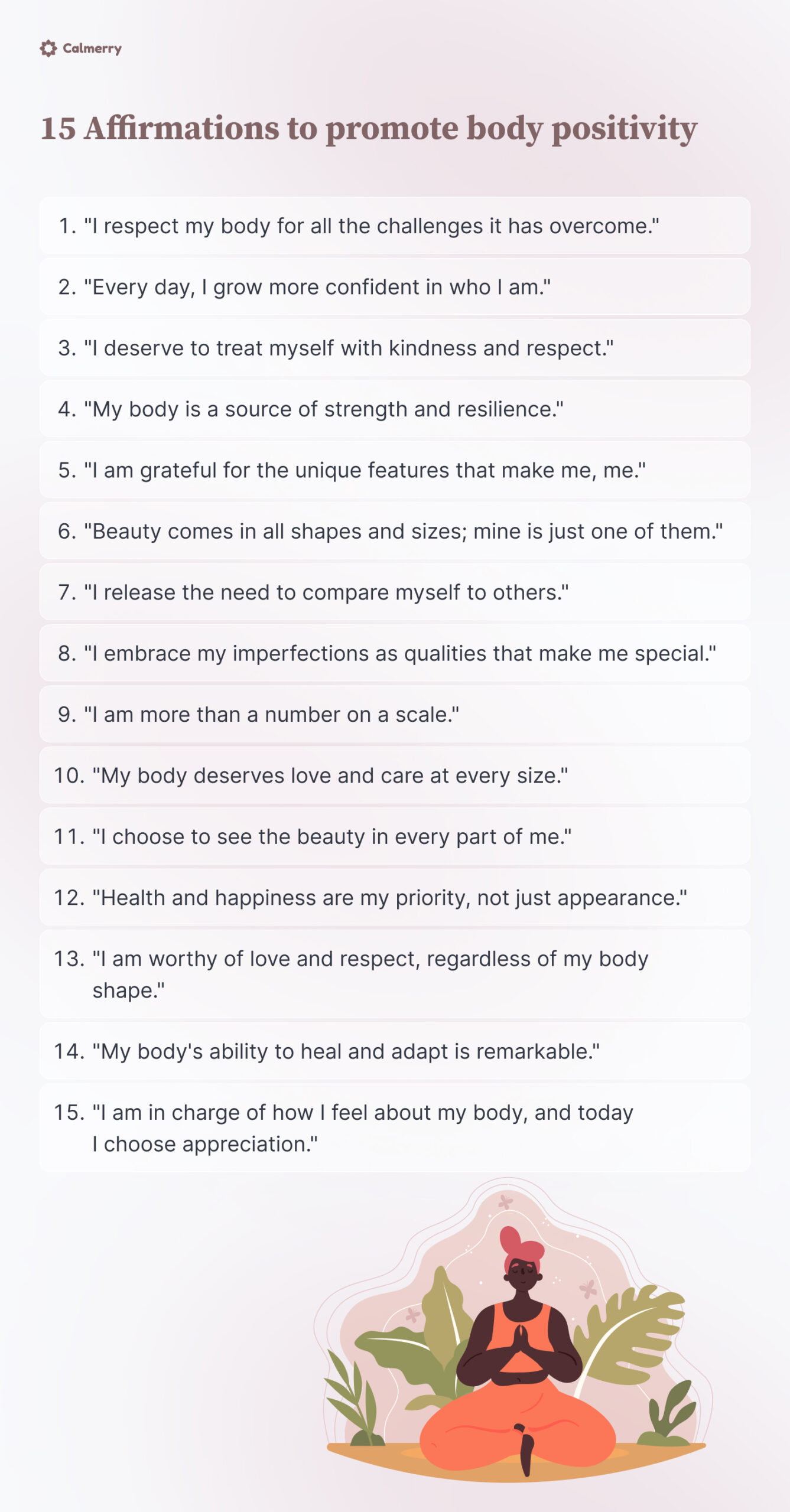How to Practice Body Positivity: Tips and Affirmations

In this article
Many of us struggle to accept our bodies as they are. Every time you look at social media or switch on the television, you are likely to see images of celebrities, influencers, or athletes whose bodies might appear very different to your own.
When bombarded with images of tall, slim, toned, or muscular people, it’s no surprise that many of us start to question the worth of our own physicality.
In the USA, a staggering 50% of teenage girls and 30% of teenage boys use unhealthy behaviors to control their weight. Similarly, 43% of men said they are dissatisfied with their body. [1] Eating Disorder Hope. (2022, July 29). Eating disorder statistics. https://www.eatingdisorderhope.com/eating-disorder/statistics-demographics [2] Phillips, K. A., & Castle, D. (2001). Body dysmorphic disorder in men. The BMJ, 323(7320), 1015–1016. https://doi.org/10.1136/bmj.323.7320.1015
So, if you are struggling with your feelings around body image, you are certainly not alone.
Luckily, there are many ways to change the way you feel about your body. In this article, we will look at the body positivity movement and nine key steps to positive body image.
What is body positivity?
Body positivity is a belief that everyone can feel good about their body, regardless of how they may have been made to feel about their weight, size, shape, or appearance in the past.
Body positivity challenges outdated societal views about what a “good” body is. It promotes the acceptance of your body because of what it enables you to do, rather than what it looks like.
Rather than focusing on, or chasing, unrealistic body standards, becoming body positive is a way of embracing your body rather than working against it.
Why is body positivity important?
In simple terms, body positivity helps you feel good about yourself just as you are. This is essential for a happy and healthy life, both mentally and physically.
- Embracing body positivity can significantly boost self-esteem.
- Many people struggle with negative thoughts about their bodies, which can lead to anxiety, depression, or eating disorders. Body positivity encourages a more compassionate and kind view of oneself, reducing these harmful thoughts.
- Body positivity isn’t about ignoring health. Instead, it’s about pursuing health for the right reasons. When you respect your body, you’re more likely to nurture it with good nutrition and enjoyable physical activities, rather than punishing workouts or restrictive diets.
- Society often promotes unrealistic and narrow standards of beauty. Body positivity challenges these standards, helping people recognize the beauty and worth in all body types, sizes, and shapes.
- Body positivity movement fosters an inclusive environment where all bodies are celebrated. This reduces discrimination based on size, shape, or appearance.
- When you’re comfortable with your own body, it can positively affect your relationships. You’re less likely to project insecurities onto others and more likely to engage in healthy, fulfilling relationships.
Is body positivity healthy?
Yes, body positivity is generally considered healthy. But it’s important to understand it in the right context.
Body positivity isn’t just about accepting your body regardless of its condition. It’s about fostering a healthy, respectful, and appreciative relationship with your body.
Yet, it’s important to balance body positivity with a realistic perspective on health.
Being positive about one’s body should not lead to ignoring potential health issues related to weight, fitness, or lifestyle choices. The key is to focus on health and well-being, not just appearance, and to understand that being healthy can look different for each individual.
For example, if body positivity is used to justify or enable unhealthy behaviors like poor eating habits, lack of physical activity, or ignoring medical advice, it’s not being applied in a healthy way. The core idea is to encourage a respectful and loving relationship with the body, which includes caring for its health and well-being.
Or, sometimes, there can be social pressure within the body positivity movement to always feel good about one’s body. This can be unrealistic and unhealthy, as it’s normal to have fluctuating feelings about one’s appearance.
Healthy body positivity should allow space for a range of feelings and experiences.
What is body neutrality?
Body positivity and neutrality are sometimes incorrectly assumed to be the same movement.
Although there are many similarities between the two, body neutrality places less emphasis on how your body looks. Rather than using forms of self-care to love the way your body looks, the focus is on acceptance and encouragement to appreciate your body simply for existing.
In general, you are discouraged from spending too much time thinking about your body, and instead to simply get on with living.
Body neutrality vs. body positivity
Body positivity – this movement emphasizes loving and celebrating your body as it is, with a strong focus on challenging societal beauty standards and embracing all body types. It encourages people to feel good about their appearance and to express care and appreciation for their bodies.
Body neutrality – shifts the focus away from one’s appearance altogether. Instead of encouraging love or positive feelings towards the body, it promotes a more neutral, accepting stance. This approach can be particularly helpful for individuals who find it challenging to embrace body positivity, as it reduces the pressure to feel positively about their bodies at all times.
How to practice body positivity – 9 best and enjoyble tips
Changing the way you think takes practice and perseverance, and the same is true when you take your first steps towards having a positive body image.
We’ve put together a list of the best, and most enjoyable, ways to start a new relationship with your body. Finding healthy ways to love, appreciate and respect your body for what it can do is the start of your journey to accepting that you are worthy of your own love.
1. 15 Positive affirmations for body positivity
Scientists have proven that affirmations can have a positive effect on the brain for those suffering from depression. [3] Cascio, C. N., O’Donnell, M. B., Tinney, F. J., Lieberman, M. D., Taylor, S. E., Strecher, V. J., & Falk, E. B. (2015). Self-affirmation activates brain systems associated with self-related processing and reward and is reinforced by future orientation. Social Cognitive and Affective Neuroscience, 11(4), 621–629. https://doi.org/10.1093/scan/nsv136

Affirmations to promote body positivity could include:
- “I respect my body for all the challenges it has overcome.”
- “Every day, I grow more confident in who I am.”
- “I deserve to treat myself with kindness and respect.”
- “My body is a source of strength and resilience.”
- “I am grateful for the unique features that make me, me.”
- “Beauty comes in all shapes and sizes; mine is just one of them.”
- “I release the need to compare myself to others.”
- “I embrace my imperfections as qualities that make me special.”
- “I am more than a number on a scale.”
- “My body deserves love and care at every size.”
- “I choose to see the beauty in every part of me.”
- “Health and happiness are my priority, not just appearance.”
- “I am worthy of love and respect, regardless of my body shape.”
- “My body’s ability to heal and adapt is remarkable.”
- “I am in charge of how I feel about my body, and today I choose appreciation.”
When you repeat affirmations every day, a process of re-wiring, or neuroplasticity, occurs within your brain. Repeating your affirmations can give you more strength to resist negative thought processes in upsetting situations. [4] Wiesenfeld, B. M., Brockner, J., Petzall, B. J., Wolf, R. C., & Bailey, J. R. (2001). Stress and coping among layoff survivors: A self-affirmation analysis. Anxiety, Stress, & Coping, 14(1), 15–34. https://doi.org/10.1080/10615800108248346
This may be helpful in banishing negative self-talk if you get anxious about wearing a swimsuit at the beach, for example.
The affirmation does not have to be related to your body or how it looks. Counteracting a negative thought with as simple as “I am kind” or “I am loved” can make you feel stronger and more confident in who you are.
2. Don’t make comparisons
Your body is unique. Just as your eye color, skin tone and fingerprints are unique to you, you will have many physical characteristics that differ to those of others. If we all looked the same, we would be unable to appreciate our individuality.
When you compare yourself to others, you may find that you end up feeling inadequate. However, when you focus only on yourself, you can start to appreciate your body’s strengths without putting yourself in second place to anyone else.
3. Be aware of social media
If you find it difficult not to compare yourself with others, one of the biggest culprits for feelings of inadequacy might be social media.
Facebook and Instagram are great ways to stay in touch with friends and family, as well as allowing you to keep up-to-date with what others are doing. But they can also negatively impact your emotional well-being.
In fact, a study in 2021 found that there was a correlation between the amount of time pent on Facebook, and the chance of developing a negative body image and an eating disorder. [5] Facebook users more prone to developing eating disorders, study finds. (2011, February 11). ScienceDaily. https://www.sciencedaily.com/110207091754.htm
A similar correlation with eating disorders was found in girls who viewed gossip- and leisure-related television programs such as “Gossip Girl”.
The study found that when the girls’ parents were involved in their media usage, and conducted critical discussions with them about what they were viewing, the girls showed more personal empowerment. This guided critique of media portrayal was seen as a protective shield against eating disorders.
Take a break
As an adult, you are responsible for what you consume digitally. Adults are not protected from the unrealistic body standards set by the media, and so if you feel that the images you see of friends, models, or celebrities are lowering your self-esteem, it may be time to take a step back from social platforms.
Whether you log out for a day, a week, or completely uninstall an app, having a break from viewing images that do not support your feelings of self-worth can be one of the simplest ways to free yourself from external pressure.
Scroll wisely
If logging out isn’t for you, or you feel ready to try social media again after a break, make sure you surround yourself with positivity.
Unfollow any pages that have previously brought you down, and replace them with people or pages that will lift you up.
Inspirational quotes and body positive bloggers are good places to start. Finding your tribe of women who feel good about their bodies can help you to feel good about yours, too.
you are not worth less because you weigh more. read that again.
— ♡Michelle Rogers♡ (@BodyPosiPower) April 29, 2021
Be сonscious of others
Just as others’ social media posts can rock your self-esteem, what you share can have an impact, too. When you plan to post something, try to consider whether it will empower others before you do so.
4. Think healthy, not skinny
In the Western world, our view of what health is appears to have become blurred with being skinny. However, being healthy does not have to mean becoming obsessed with the scales or losing weight. Weighing yourself can be misleading as muscle weighs more than fat, and so even athletes will be heavy but lean.
Additionally, your body can still be perfectly healthy, even if you do not perceive yourself to be skinny. A heavier body can still run a marathon, raise children, and enjoy a healthy sexual relationship.
As part of body positivity, celebrating what your body can do is far more important than giving yourself a hard time because of your weight or what your body looks like.
– Hannah Rose, Copywriter with a clinical background
5. Use your body
You are more than just a body. Your body’s purpose is to allow you to do things in life.
As part of body positivity, it is time to get out and do the things you love! If you have lacked confidence in your body for some time, don’t let it hold you back any longer.
When you embrace your body as a vessel, rather than your identity, it frees you up to get the most out of life. Take up a new hobby, meet a friend for coffee, or book a vacation.
If you want to get out for a walk, don’t worry about getting hot and sweaty, or how you might look. Your body is doing everything it needs to support your goal, and getting sweaty should be seen as a badge of honor for feeling good about exercising.
6. Be comfortable
If you’ve always limited your wardrobe because you feel self-conscious, make the effort to stop. Find clothes that feel comfortable and suit your shape, rather than selecting items that are in fashion but don’t make you feel great.
Wear shorts or dresses when it’s hot, and stop worrying about how your body looks when you do. Forcing yourself to cover up when it’s 35oC will make you feel miserable. If you wear clothes that make you feel comfortable and cool, you’ll enjoy life so much more.
7. Compliments
Receiving a compliment can make your day. Try to add a little sunshine to someone else’s day by giving them a compliment. When you are kind to others, you may find it easier to be kinder to yourself, too.
If you receive a compliment, thank the person giving it, rather than denying it or shrugging their words off. Accepting a compliment can help you to start believing that their words are true, building your self-confidence.
8. Treat your body
Your body deserves to be treated and respected regardless of how it looks, so make time to give your body some love. Take a luxurious bath, enjoy a meal in a restaurant, book a massage or get into bed at 8pm.
Do whatever feels right for you, and celebrate all that your body does for you.
9. Try therapy
If you want to improve your relationship with your body but are struggling to become body positive, online therapy sessions could help you to start thinking in new ways.
A therapist can help you explore your feelings about your body, and make tailored suggestions of ways to cherish what you have.
How to be body positive and healthy
Although being body positive involves accepting and celebrating your body exactly as it is, remaining healthy is also important.
If this sounds like a slippery slope to dieting, exercising, or feeling bad about your choices, don’t panic. Supporting your well-being when you switch to a body positive outlook is different to what you may previously have considered healthy.
Get moving
If high school gym has left you with a fear of exercise, take time to rediscover why moving feels good. You don’t have to run a marathon or invest in an expensive bike.
Get out for a walk in beautiful scenery (or even just round the block), feel the wind rushing in your hair on a gentle cycle ride, or swim in the cool ocean.
Rather than seeing movement as torture, choose a form of exercise that feels so good.
– Hannah Rose, Copywriter with a clinical background
Aside from the physical benefits, scientists have proven that movement or exercise “improves mental health by reducing anxiety, depression and negative mood and by improving self-esteem and cognitive function”. [6] Sharma, A., Madaan, V., & Petty, F. D. (2006). Exercise for mental health. The Primary Care Companion for CNS Disorders, 8(2). https://doi.org/10.4088/pcc.v08n0208a
It also minimizes social withdrawal. Little beats the rush of endorphins you get after exercising, which experts have said reduces the perception of pain and triggers positive feelings similar to that of morphine! [7] Bruce, D. F., PhD. (2008, May 29). Exercise and depression. WebMD. https://www.webmd.com/depression/exercise-depression
Change your perception of health
Forget weighing yourself or counting calories as a measure of health. Choose fresh foods that give you the protein, fiber, and carbohydrates your body needs to function well, and enjoy treats, too.
Measure your health not in your appearance or weight, but in terms of your happiness, sleep, emotional security, physical strength, or the absence of physical pain.
Nurture your mental health by writing in a journal, arranging in person or online therapy for self-esteem, taking up a new hobby or prioritizing getting enough sleep.
If you have negative feelings about your body, these can quickly affect your mental health, manifesting as depression, anxiety, or even resulting in eating disorders.
Ring-fencing time to cherish your mental health can naturally reap benefits for your physical health.
Final thoughts
Being slim and being healthy are not the same thing. If you struggle with body image, becoming body positive can be a successful way to restore both your physical and mental health.
Being positive about your appearance allows you to celebrate your body for all that it allows you to achieve, without becoming obsessed by dieting or the bathroom scales.
If you’re on this path and find yourself needing support, especially in dealing with body image issues or building self-esteem, professional guidance can be invaluable. At Calmerry, you can connect with experienced mental health professionals who understand these challenges.
Start with a brief survey – and get matched with the right expert within 1 hour.
Eating Disorder Hope. (2022, July 29). Eating disorder statistics. https://www.eatingdisorderhope.com/eating-disorder/statistics-demographics
Phillips, K. A., & Castle, D. (2001). Body dysmorphic disorder in men. The BMJ, 323(7320), 1015–1016. https://doi.org/10.1136/bmj.323.7320.1015
Cascio, C. N., O’Donnell, M. B., Tinney, F. J., Lieberman, M. D., Taylor, S. E., Strecher, V. J., & Falk, E. B. (2015). Self-affirmation activates brain systems associated with self-related processing and reward and is reinforced by future orientation. Social Cognitive and Affective Neuroscience, 11(4), 621–629. https://doi.org/10.1093/scan/nsv136
Wiesenfeld, B. M., Brockner, J., Petzall, B. J., Wolf, R. C., & Bailey, J. R. (2001). Stress and coping among layoff survivors: A self-affirmation analysis. Anxiety, Stress, & Coping, 14(1), 15–34. https://doi.org/10.1080/10615800108248346
Facebook users more prone to developing eating disorders, study finds. (2011, February 11). ScienceDaily. https://www.sciencedaily.com/110207091754.htm
Sharma, A., Madaan, V., & Petty, F. D. (2006). Exercise for mental health. The Primary Care Companion for CNS Disorders, 8(2). https://doi.org/10.4088/pcc.v08n0208a
Bruce, D. F., PhD. (2008, May 29). Exercise and depression. WebMD. https://www.webmd.com/depression/exercise-depression
online therapy
live video session


